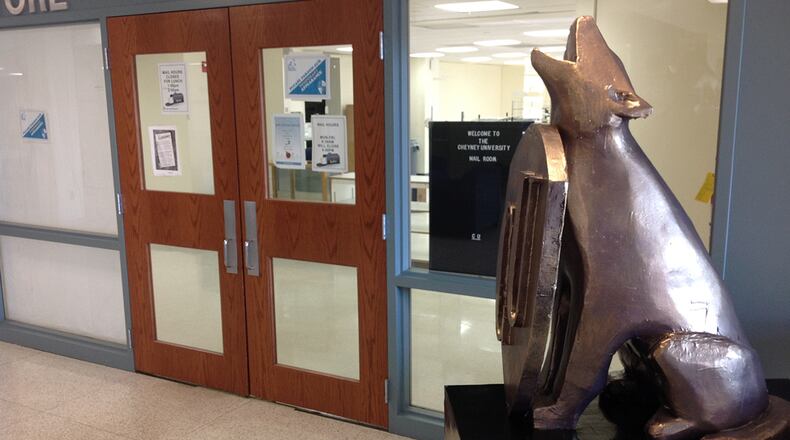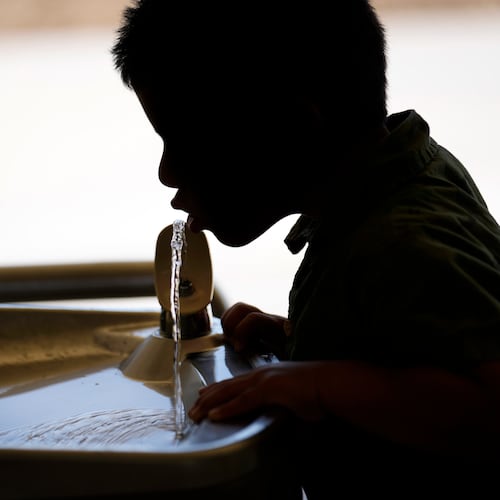Cheyney University sits on 275 acres of former farmland at the base of a narrow and winding two-lane road in Pennsylvania’s affluent Chester County.
The 180-year-old school’s immaculate quad is ringed by a series of stone buildings built between 1903 and 1938. But behind the quad sit several shuttered structures, closed either because of shrinking enrollment or because they need to be torn down after years of neglect. On the edge of campus is the school’s now-quiet O’Shields Stevenson Football Stadium.
» GO DEEPER: Perilous times for black colleges
» FULL COVERAGE: The entire "HBCUs: A Threatened Heritage" series
The oldest historically black university in the country canceled its Thanksgiving Day football game against Alabama State last season. Cheyney couldn’t afford to send the team to Montgomery. Probably just as well, since the team finished 1-10 and was outscored 360-13 in its last six games.
The flagging football team and the closed buildings are fitting emblems of Cheyney. If there is a blueprint for what can go wrong at a college, Cheyney has followed it closely for about the past 20 years.
- It's on its fourth president in 10 years.
- Beginning in 2013, Cheyney began borrowing from the state every year to pay its bills and keep the lights on. The debt now stands at $30.5 million.
- Enrollment plunged from 1,586 in 2010 to 711 in 2015: a decline of 55 percent. During that same period, core revenue fell by 26 percent.
- The university's accrediting agency put Cheyney on probation in 2015. It's still there, although Cheyney was granted an extension of its probation this year — a hopeful sign. Loss of accreditation would mean no federal financial aid for Cheyney students, 90 percent of whom receive some form of aid. It is a virtual death penalty for a college.
“Decrease in enrollment, instability in leadership and not paying significant attention to the bottom line,” President Aaron A. Walton, who took over as interim president in June, said recently about the school’s problems. “A lot of factors. Some of them are cultural, meaning that there was an assumption that the state would continue to support the school even if it was operating inefficiently.”
In August, the Board of Governors of the Pennsylvania State System of Higher Education agreed to forgive the $30 million in loans if the school can balance its budget during the next three years.
But that $30 million is not to be confused with a Justice Department investigation into the disposition of $29 million in mishandled federal grants, loans and work-study funds that were doled out to students who did not qualify for them, or in some cases were not even in school. (This was before Walton’s time.)
Customer service and efficiency on campus were so bad that more than 3,000 college applications mailed between 2012 and 2015 were never even opened. And while some students left the school with heavy debt, others were never charged as Cheyney failed to collect $7 million in outstanding tuition bills.
“I don’t think when I came here anybody had an expectation that the accreditation would be extended,” Walton said. “We had [been on probation] for two years and nothing had been done. We were on the last six months. It was serious.”
»MORE: Cheyney University - A History
‘You think I’m the man?’
It is lunchtime and James Mergile, a 24-year-old senior from Brooklyn, strolls through the school’s cafeteria like he owns it. He greets all of his fraternity brothers and hugs all the girls.
A visitor comments that he seems very popular.
“You think I am the man? Nah,” the psychology major said laughing. “I might look like the man, but we are so small now that everybody knows everybody.”
To address the dip in enrollment, previous administrations began accepting about 90 percent of students who applied to the school, filling classrooms with students who often were barely qualified for college work.
“Cheyney has always been a college of opportunity, which means that a lot of students may not have been academically prepared or financially prepared to go to college, but showed promise,” Walton said. “Which has had a negative effect on both retention and graduation rates because of the level of remediation that a lot of students require. That hurt the school. We still have to have to be here to serve those students, but there has to be a balance.”
Credit: Ernie Suggs
Credit: Ernie Suggs
»MORE: Cheyney University - Notable Graduates
About 125 of Cheyney’s 755 students are in the elite Keystone Honors scholarship program, which covers their tuition, room and board and fees if they maintain their grades. Keystone has a 95 percent freshmen retention rate and a 72 percent four-year graduation rate.
But even with the Keystone students propping up the overall numbers, only 44 percent of freshmen made it to their sophomore year, and fewer than 20 percent of all students graduated within six years.
“The school and the professors don’t want to see anybody fail,” said Rashawn Frances, 22, a graduating senior from New York. “We are so isolated here that there is nothing to do but do your work and study. But if you want to party and then flunk out, that is on you.”
‘Didn’t come here to make friends’
It is hot in the president’s office, but the 70-year-old Walton refuses to sweat. He spent more than 40 years in Pittsburgh in the insurance business, specializing in turning around failing companies.
He lives on campus and gets around on a golf cart. It sits outside his office in the 79-year-old Biddle Hall and is free for anybody to use whenever they want. He eats with students in the cafeteria several times a week, is a frequent visitor at football practice and runs with the track team every morning.
Walton has never run a university, although he formerly served as a member of the state Board of Governors and chaired a task force that created a business plan for Cheyney. He says he can’t afford to waste time. And he isn’t.
Credit: Ernie Suggs
Credit: Ernie Suggs
He isn’t a Cheyney graduate, knew very few people when he came on campus and was also freaked out about the narrow road leading to the campus. And that is a good thing, he says.
“There’s probably varying reactions to my being here. If you are personally impacted by some of the things that we had to do, then you are probably not overly happy with me,” Walton said. “And I’m not overly happy about having to do those things, but I know that if we don’t make change, Cheyney won’t exist. I didn’t come here to make friends. My sole focus is to turn this school around.”
Since June, he has laid off 23 staffers and administrators and is looking to get rid of at least eight faculty members as he reins in the budget. The school has fewer than 20 undergraduate degree programs and two master’s degree programs, and those numbers will also decrease.
Plans are in place to recruit better, more qualified students – who will pay their tuition. That would include casting a wider recruiting net and emphasizing agreements already in place to get students from community colleges.
After the losses from 2010 to 2015, there was about a 1 percent increase in freshmen last fall.
“It is not going to be easy, but what you have to do is at the same time that you’re cutting, you have to begin to look toward the future. You have to shrink to grow,” said Walton, who plans to retire in 2021 — after passing a balanced budget. “I believe that the potential here is unlimited and that in the next five to seven years Cheney will be a model institution. Period.”
Credit: Ernie Suggs
Credit: Ernie Suggs
About the Author
Keep Reading
The Latest
Featured





